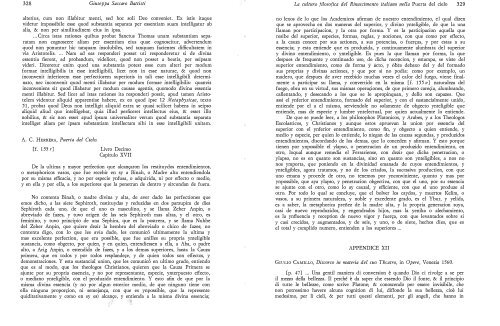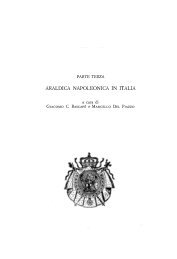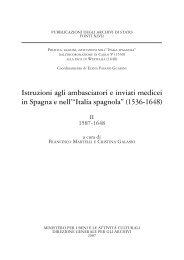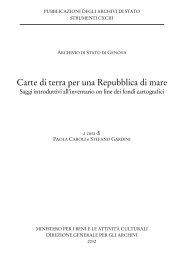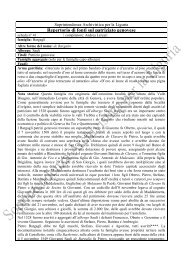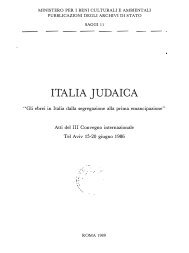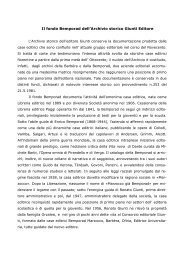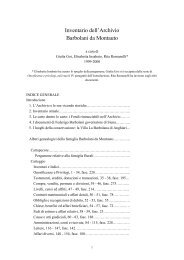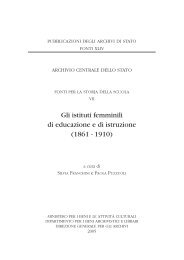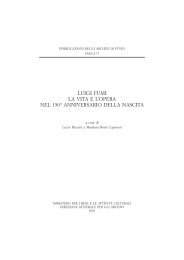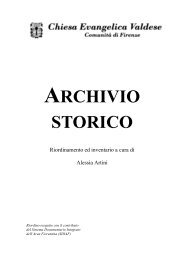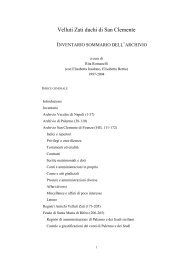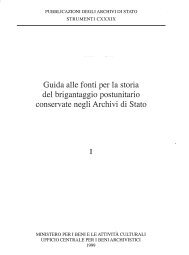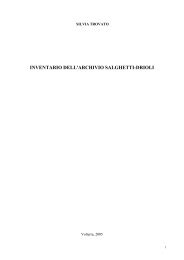ITALIA JUDAICA - Direzione generale per gli archivi
ITALIA JUDAICA - Direzione generale per gli archivi
ITALIA JUDAICA - Direzione generale per gli archivi
Create successful ePaper yourself
Turn your PDF publications into a flip-book with our unique Google optimized e-Paper software.
166 Abraham i\felamed<br />
tales for didactic purposes. Only then did he add that the same method was<br />
also employed by the J ewish Sages 100 .<br />
De' Rossi related, in fact, to the great debate of Renaissance historiography<br />
which was centred around the essential questions: What is the aim<br />
of writing history? What is the demarcation line between rhetoric and poetry,<br />
on the one hand, and history on the other? The great debate between the<br />
Ciceronians and their opponents, between the camp of Livy and the followers<br />
of Tacitus, was centred around this fundamental question: What is the higher<br />
aim of writing history, to relate truth or to teach by way of moral lessons<br />
and please as literature?<br />
The problem had been summed up by one of the great historians of the<br />
early Italian Renaissance, Leonardo Bruni, who, following the Ciceronian dictum,<br />
clearly distinguished between the two different aims of historical writing<br />
- the scientifìc and the didactic -: « Aliud est enim historia, aliud laudatio ».<br />
« History, he says, should follow the truth, panegyric goes beyond the truth<br />
in i ts praise » 101 .<br />
Within this context, de' Rossi asserted in fact that the writing of history<br />
can serve in these two different categories. His criticism of the historical veracity<br />
of the story about Titus' death belongs to the fìrst category. His indicadon<br />
that the Sages consciously and legitimately used the story for moral and<br />
didactic purposes relates to the second.<br />
De' Rossi related the Sages' disregard for historical truth to their conscious<br />
moral and didactic aim of telling historical tales. Thus, in his opinion,<br />
the Sages only related to one of the purposes of the study of history, the<br />
didactic aim. They totally disregarded the other - and according to de'<br />
Rossi - higher aim of the study of history, that is, historical truth.<br />
In another chapter of Imrei Binah (eh. 27), he went further and explained<br />
the theological reasons for the Sages' refraining from seriously dealing with<br />
history, the cause of the many mistakes he found in their references to historical<br />
matters.<br />
De' Rossi opened this discussion with his above mentioned admiration of<br />
Livy as the archetype of the <strong>per</strong>fect historian 102 . Livy, considered to be the<br />
greatest Roman historian by early Renaissance Humanists, was used by de'<br />
Rossi as the model to which the historiographic endeavours in Judaism were<br />
compared.<br />
100 A. DE' Rossi, Meor Einaim ... cit., p. 209; see S. W. BARON, Azariah de' Rossi's<br />
Historical Method ... cit., p. 225.<br />
101 B. ULLMAN, Leonardo Bruni ... cit., p. 52. On the whole issue W. J. BouwsMA,<br />
Three Types ... cit., p. 306; P. A. GRENDLER, Francesco Sansovino and Italian Popular History,<br />
1560-1600 in « Studies in the Renaissance » 16 (1969), p. 144; G. SPINI, The Art of<br />
History ... ' cit., pp. 104, 112-113, 122-125; M. PHILIPS, Machiav lli, Gu!ccia : dini an the<br />
Tradition of Vernacular Historiography in Florence, in « Amer1can H1stoncal Rev1ew »,<br />
84 (1979), p. 86.<br />
1o 2 A. DE' Rossi, Meor Einaim ... cit., p. 254, see above n. 67.<br />
The Perception of ]ewish History in Italian ]ewish Thought 167<br />
Alas, when contemplating the development of Jewish culture, de' Rossi<br />
had great trouble fìnding any historical discussion which reached the stature<br />
of Livy's. This, despite the fact that the Torah, in his opinion, deals not only<br />
with laws and commandments but also with the history mankind.<br />
",n,,,i', !:l"'T:'i n,,.t' ccnn;, c,,C:'i » 10a Por him, as for any<br />
other advocate of the learning of the so called « external wisdoms » the T or ah<br />
i clud d . ali br ar: ches of human learning.- Since- the study of histry was, in<br />
h1s opmwn, an mtegral part of the Torah, it necessarily followed that it was<br />
originally meant to be studied not only in leisure time, but constantly, like<br />
any other aspect of the Torah. An incidental benefìt for his justifìcation of<br />
the study of history was its usefulness for the correct understanding of present<br />
day events and for the better direction of human affairs, themes clearly echoing<br />
Machiavelli 104.<br />
However, the study of history was not emphasized in the course of the<br />
development of Jewish thought. Although, de' Rossi indicated, some serious<br />
historical discussion could be found in the writings of the lifes of Philo, Mai-<br />
103 A. DE' Rossi, Meor Einaim ... cit., p. 255. Compare to Ibn Ezra's attitudine see<br />
Y. H. YERUSHALMI, Clio and the Jews ... cit., p. 614.<br />
104 A. DE Rossi, Meor Einaim ... cit., p. 254: · t,v c•t,,vt, r;•r;tv r; l"1l.''.,' r;r; »<br />
f:,:::::. C'l!O:"! c,,,t,;, Mi' :"! ':l ,,Jr,'l.'l' ,N ,l.' 'llVN :"!l ri''lli:l lt, ll"1l"1 nm'l:::llri ''lli:IC<br />
« .:l"l.' l"1t,l.'ll">ri :l'li't,l i''Jri i''M'l:-rt, lJl.' ,l.':ll lJ.,V:l :ll!Ori l"1N 'l':::IJ l:ri:ll ,J"11Jl,:-r ··<br />
Baron correctly pointed out that this is a free translation from Livy (Ab urbe Condita,<br />
prface). o":ever, I do ot know how he came to the conclusion that de' Rossi « expressly<br />
reJected L1vy s adage<br />
:<br />
whtch saw the function of history as teaching how to search for<br />
the useful and to avmd the harmful », S. W. BARON, Azariah de' Rossi's Historical Method ...<br />
it. pp. 2?6-207 nd P· .<br />
423, n. 3. plain reading of the text does not justify his<br />
mte pretatlO . n. De Ross1 paraphrased Ltvy's adage because he accepted his opinion and<br />
constdered 1t relevant also for the study of Jewish history. Moreover, expressions like<br />
« J"1':ll.'ll"1:"! :l'lj?r,l i''lri i''M'lrir, » frequently appear in Medieval Jewish thought, mainly<br />
concerning the ethical aim of human laws. For instance, Albo, Iqquarim, I, 7: i''M'lrit, »<br />
« r-TNJ:"l :l '"li' t,, r;m:-r i''M'lrir, » ·" 'llVl'ri :l'lj?r,, t,lll.'ri The expression « lJ1' .,l.':ll ,.,l.':l »<br />
is a paraphrase on Samuel II, 10, 12. Compare to Abravanel, Nahalat Avot, 4 and A.<br />
PoRTALEONE, Shiltei ha'Gibborim... cit., p. 35a. De' Rossi repeated this opinion several<br />
times, for instance: l'Tr;t, llri ':l:::ll'lV r; :-rtvv':l r;:;,':l:-r:l c:lll"1 .,,r,r,, pl:ll"1rir, +++ »<br />
C'rir,Nr; 'Jl!l':l lmt,ll.'l!ll 1Jl"1N lJ'l:llV r'!Jri +++ C'lVJNl c•r;t,N Cl.' l'l"1lir,ln:l Jril"1J 1'Nl ,,r,<br />
"+++ l'':lN lV'l,ri t,:;, t,l.' 'lcll ri:ll.' Mi'J ri:l C'l.'lVri Ml'llj?:"!l C''lll!lCri 'toli:llV 'llt'N:l<br />
A. DE' Rossi, Meor J?inaim ... cit., p. 255, and see n. 97. Baron, however, erroneously<br />
conclude? that: « Azartah yet declares the study of history to possess this didactic value for<br />
the genttle world but not for the Jews », S. W. BARON, Azariah de' Rossi's Attitude ... cit.,<br />
p. · Also, l?., Azariah e' Ros i's Historical Method ... cit., p. 214: « his particular non<br />
actlvtst concept10n of the atm of htstory ». Compare de' Rossi's attitude to Machiavelli's as<br />
e xp ressed in . th pref ce to ., the rst book of the Discorsi: « ... coloro che leggeranno queste<br />
mte de:J raztom, p ssm ptu facilmente trame quella utilità <strong>per</strong> la quale si debba cercare<br />
la cogmz10ne delle tstorte », N. MACHIAVELLI, Discorsi ... cit., p. 76.<br />
'


